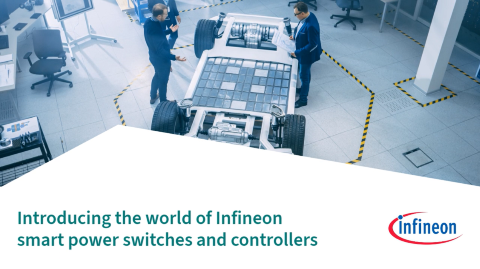E/E architecture zone controller
Efficient aggregation of power distribution, gateway, and multiple load actuations - discover our scalable and flexible zone controller solutions
A revolutionary E/E architecture transformation
Embrace the shift towards centralized control in automotive E/E architectures and transform designs with Infineon's scalable zone controller solutions.
Comprised of the power distribution (PD) system and the in-vehicle network (IVN), legacy E/E architectures are predominantly organized in domains connected via gateways. However, the software-defined vehicle (SDV) trend and wire harness optimization are driving the shift towards a zonal architecture with central computing.
In this new architecture, the PD is electrified and the former relay and fuse box function is decentralized in the zone controllers. In parallel, the IVN for data and signal distribution transitions from a flat domain architecture to a hierarchical layer structure with central computer, zone controllers, and endpoints.
The decentralized PD and centralized IVN aggregate multiple ECU functions in a few zone controllers, encompassing power distribution, gateway, and load control capabilities. Our commitment to quality ensures our advanced chipsets are tailored for this transformation, enabling seamless integration and fully unleashing the technical and commercial potential of zonal architectures.
Innovative semiconductor technology for a complete chipset solution
In lockstep with the increasing extent of functional integration, the complexity of zone controllers is continuously growing. Infineon provides comprehensive system knowledge and support with over two decades of expertise in relay and fuse replacement, ECU design and functional safety ECU development. Technical documents are available and tools are provided to enable easy design-in and reduce time-to-market.
Examples are:
- Application notes and whitepapers to support relay and fuse replacement
- Arduino shields for easy-to-use device evaluation
- Design-in tools and simulation models for virtual prototyping and system evaluation
- Expert forums to place your questions or provide your valuable feedback
Scalable and flexible product families in modern zone controllers
Zone controller designs require scalable and flexible semiconductor chip-set solutions. Specific needs depend on the extent of functional aggregation, the diversity of gateway communication interfaces and protocols, the associated performance requirements and the number of output variants for load control. Infineon offers scalable product families to enable module designs fitting to all kinds of zone controller variants.
Examples are:
- Discrete and integrated power supply solutions in multiple product families for supply and communication
- Scalable and flexible MCU families with respect to performance, memory, peripherals and safety and security implementation
- Supplementary NOR Flash solutions enabling right-sizing of memory capacity
- Smart power product families with a wide range of features in pin-compatible packages with common footprints and interfaces
- Motor control with scalable MOTIXTM product families from low integration to high integration, including software support
- Multiple, scalable MOSFET families, to combine with gate driver as switches or in conjunction with MOTIXTM for motor control
Due to the aggregation of control functions in an ever reducing number of control units and the simultaneous increase in sensor data, electronic functions and network capabilities, the connectivity requirements of zone control units are increasing immensely. This implies the need for improved computing power per zone controller MCU and also requires significantly more interfaces to end points. In some cases, multi-gigabit interfaces are required to accommodate communication along the in-vehicle network. Infineon microcontrollers address these challenges and set new standards in the use of automotive MCUs for safe & secure processing. They come in a wide range of connectivity options, from traditional automotive low-speed interfaces to very fast multi-gigabit Ethernet interfaces.
The optimal way to transport and use electrical energy in the car
Driven by an increasing demand of power in the car for ADAS, automated drive (AD) functions, central computing, electrical power steering, infotainment, electro-mechanical braking or brake-by-wire, automotive 12 V power distribution systems are reaching their limit. As a solution, the adoption of a 48 V-based system emerges as the most efficient and compliant approach for transporting and utilizing electrical energy within regulatory frameworks, particularly with regard to contact protection ISO 6469-3.
This has spurred significant discussions regarding a comprehensive car-level strategy, aiming to achieve substantial system-wide cost savings through significant enhancements in efficiency, power losses, and wire harness optimization – encompassing aspects such as component cost, weight, complexity, routing, manufacturing, and assembly – all achievable with a holistic 48 V approach.
With more and more applications potentially moving from 12 V to 48 V, requirements towards the automotive zone controller with its integrated secondary power distribution change significantly. Infineon supports this trend with forward-compatible system designs and a subsequent 48 V product portfolio.
Premium service for advanced automotive systems
Premium service describes a broad field of Infineon's core competences and includes: Operational excellence, zero-defect mentality, disaster and risk management planning, global customer support and distributors, system competence teams and highest automotive qualification standards.
Examples on supported standards:
- AEC-Q 100/101 qualification, leading short-circuit robustness, lowest field return rates (ppb)
- Expanding product families with grade 0 qualification for harsh environments
- Product families for safety-critical applications to support ASIL B to ASIL D with ISO-ready documentation or ISO-compliant development

- Smart power switches and controllers not only are they key partners for the realization of automated driving but they are also one of the founding blocks of current automotive megatrends.
- They are essential when it comes to supplying and distributing power, as well as protecting devices from excessively high current or temperature.



